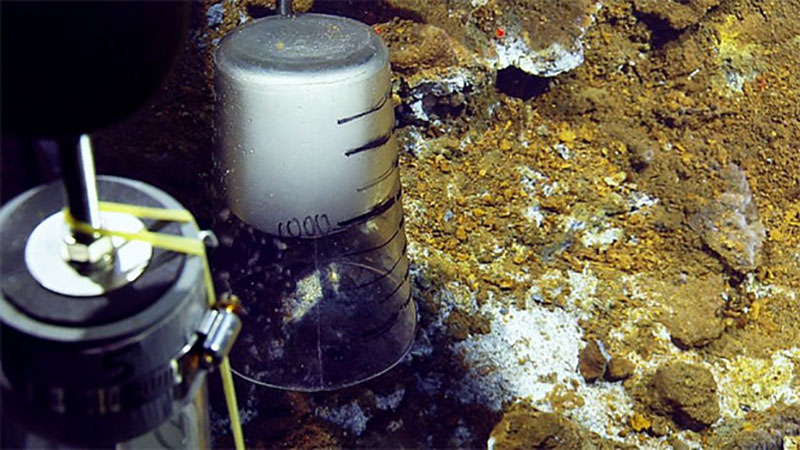Investigating Greenhouse Gases in the Deep Sea Using Telepresence Technology
October 3, 2014

Taking samples from an active underwater volcano can be a tricky business requiring careful maneuvering by the underwater vehicles and their pilots. Various instrument readings and samples collected include gas, rocks, bacterial samples, and high resolution mapping of the entire area. Image courtesy of the Ocean Exploration Trust.
From September 25 to October 9, investigators from the Woods Hole Oceanographic Institution are being funded by NOAA’s Ocean Exploration and Research Program to help conduct the first-ever in situ chemical and stable isotopic exploration of two unique seafloor sites in the Caribbean (the Kick ‘Em Jenny Seamount and Barbados Mud Volcanos). The scientists are sailing on the Ocean Exploration Trust Exploration Vessel Nautilus and using the remotely operated vehicle Hercules.
Scientists participating in the expedition are investigating the discharge and fate of important greenhouse gases (methane and carbon dioxide) released through natural processes at the seafloor. They will employ new capabilities in deep-sea chemical sensing. Geochemical exploration of these important sites will improve understanding of volcanic releases, the nature of volcanically hosted seep communities, and the magnitudes of transformations of methane and carbon dioxide from these regions.
The project is part of the Transforming Remotely Conducted Research through Ethnography, Education & Rapidly Evolving Technologies (TREET) project funded by the National Science Foundation. TREET is an effort to explore how remote human–robot interactions, or telepresence, can transform the future of ocean research and advance research experiences for early-career scientists and undergraduate students.
During the cruise, remote operations will be monitored by ethnographers studying the interactions among scientists, the human–remote robot interface, and its application to ocean exploration.